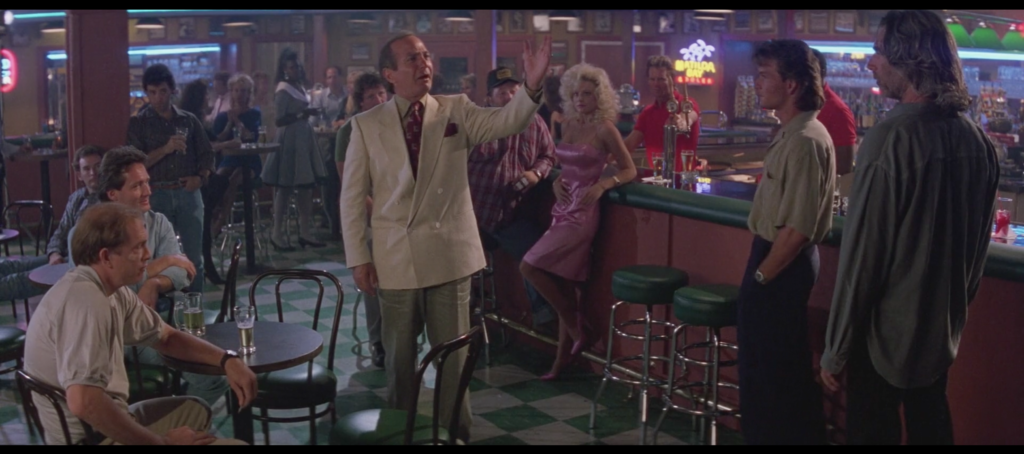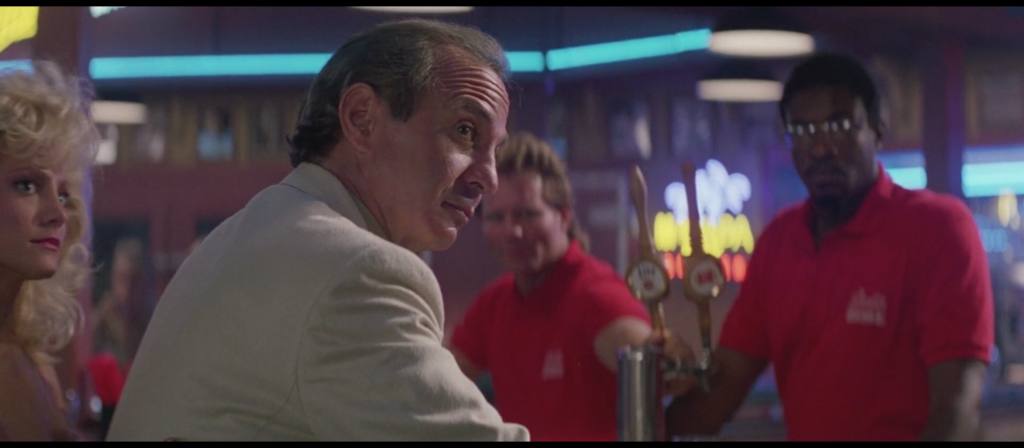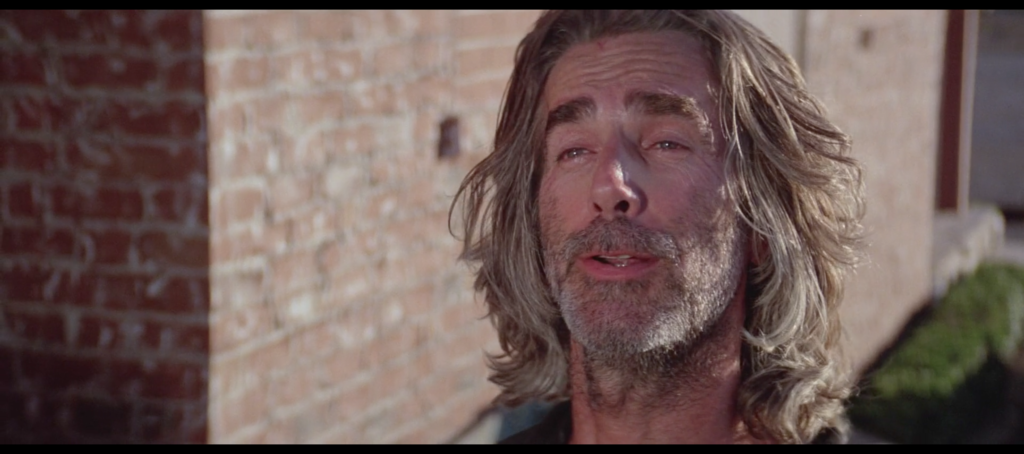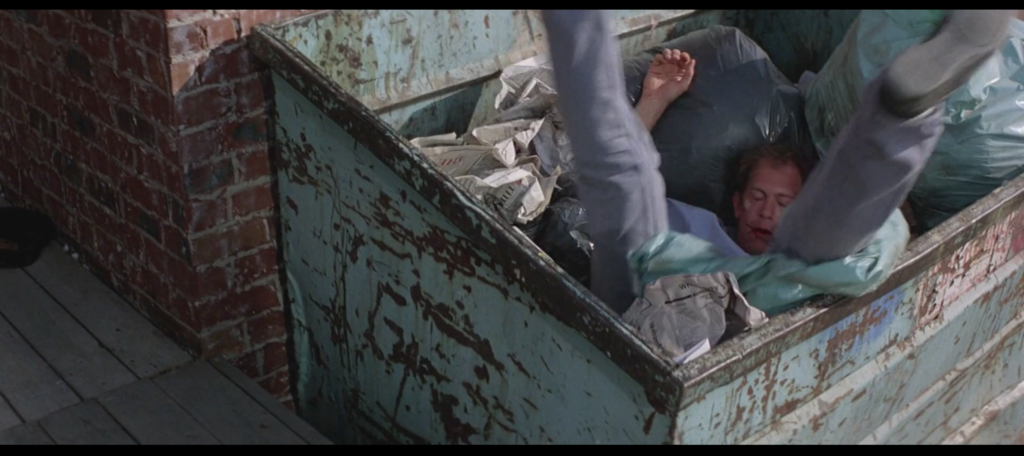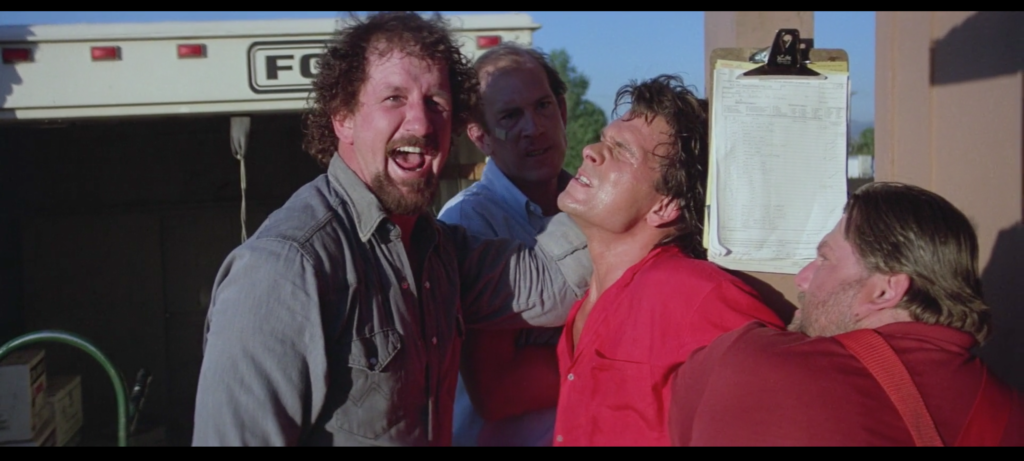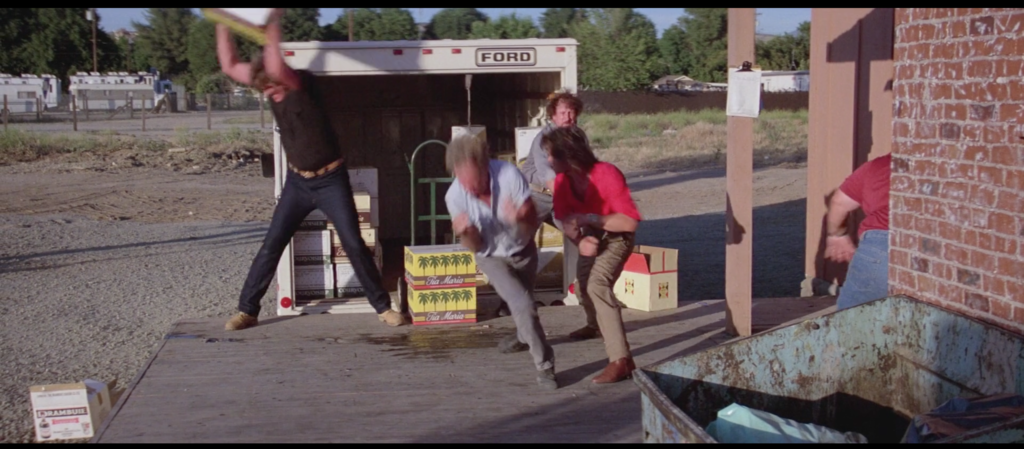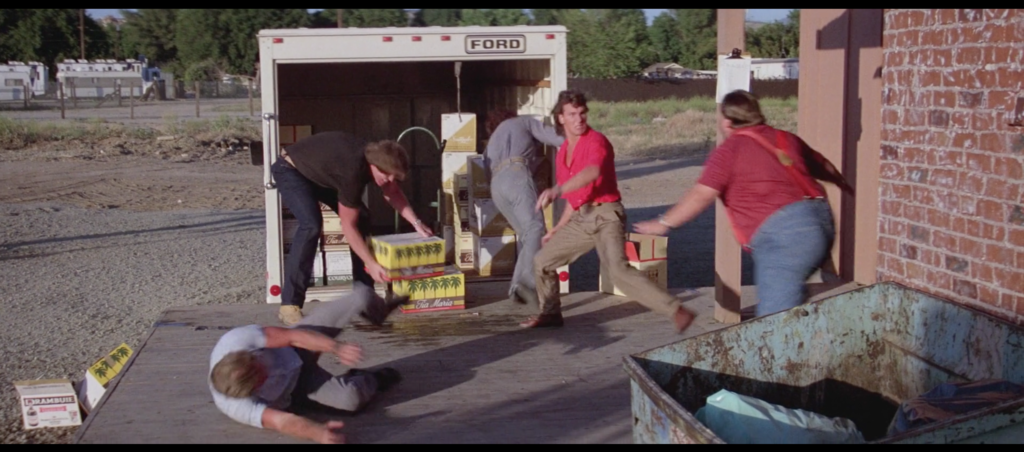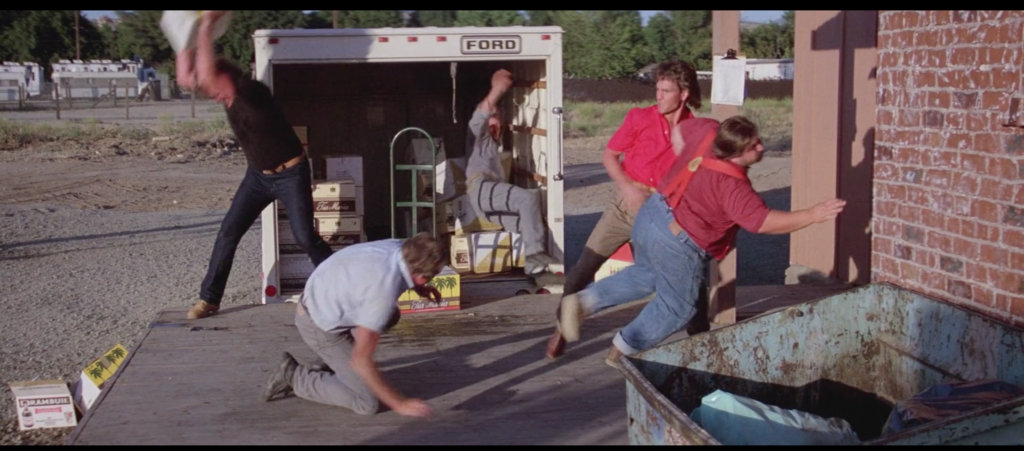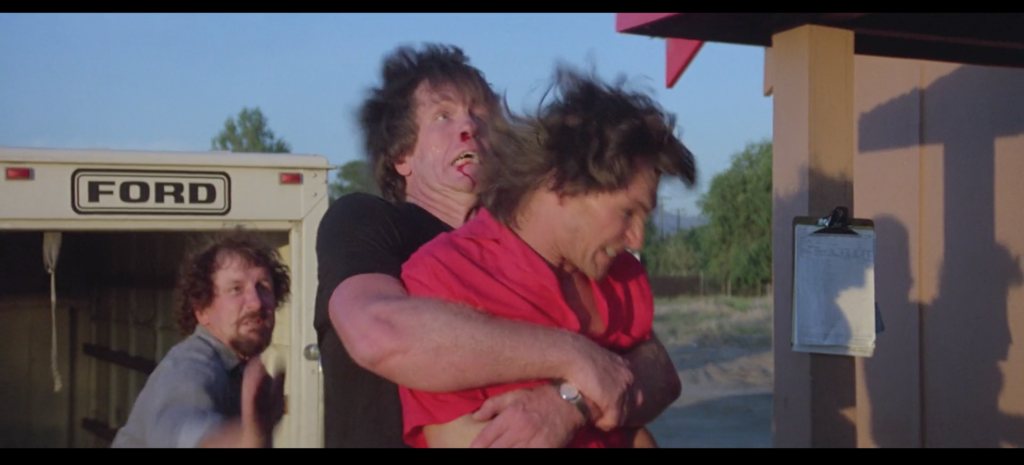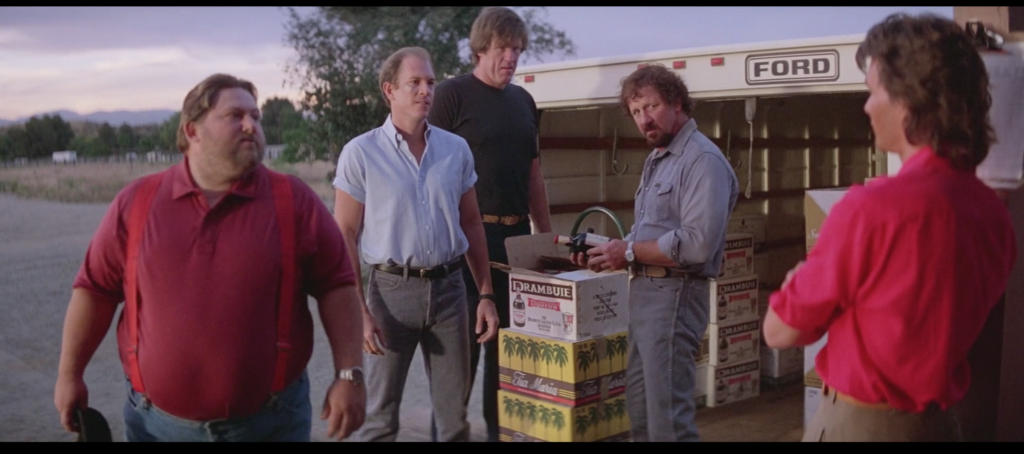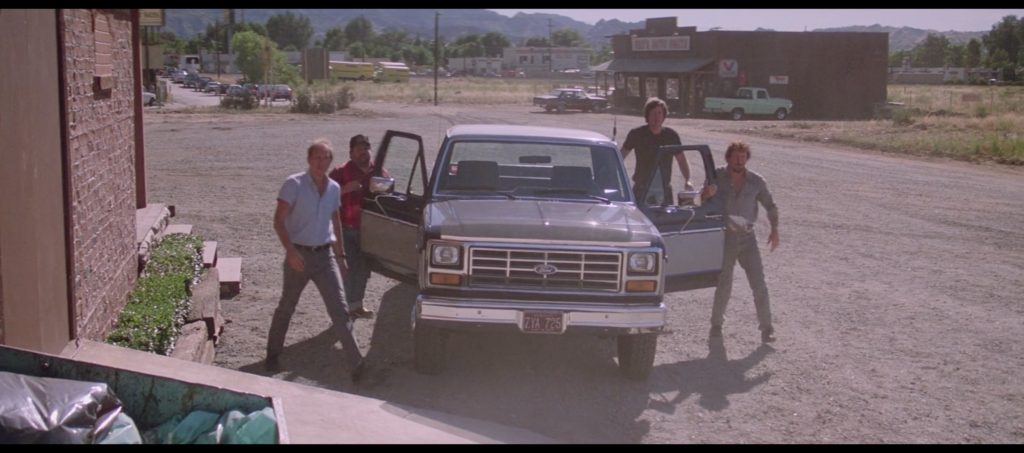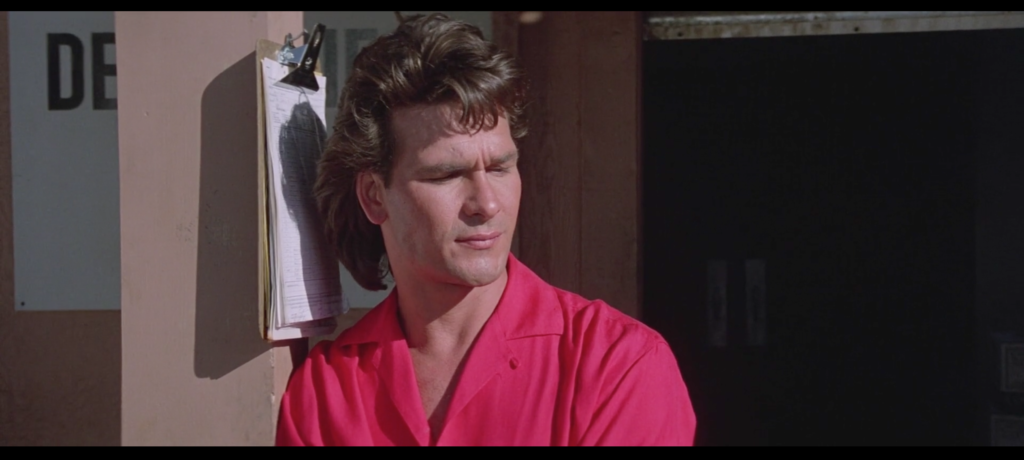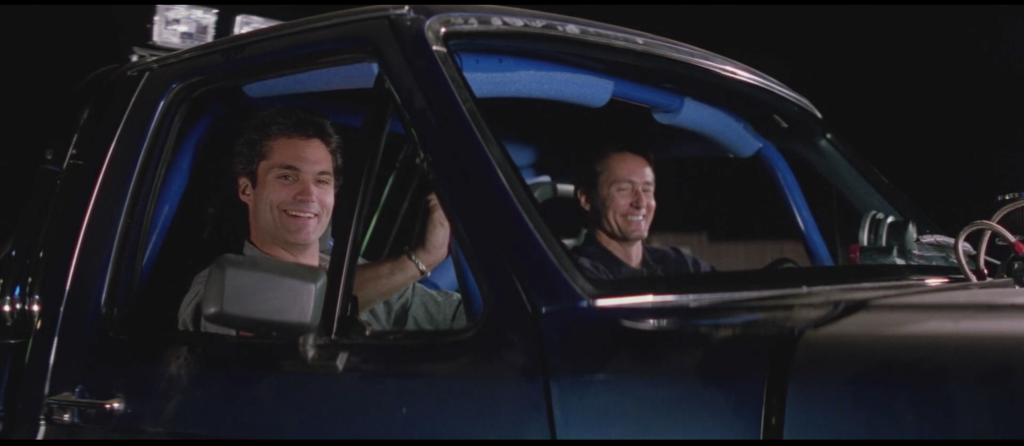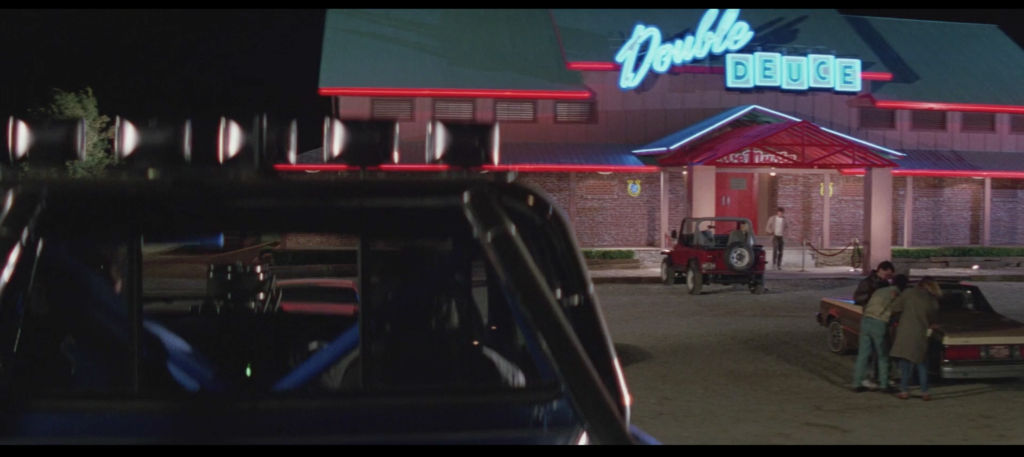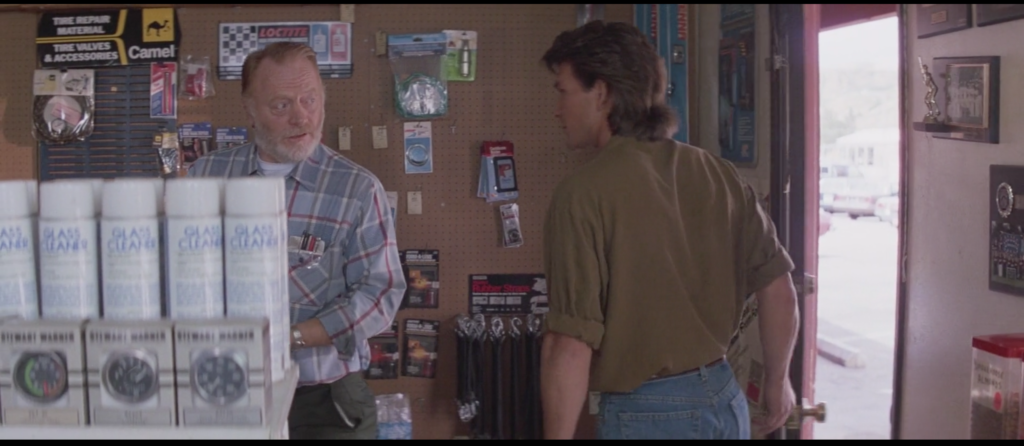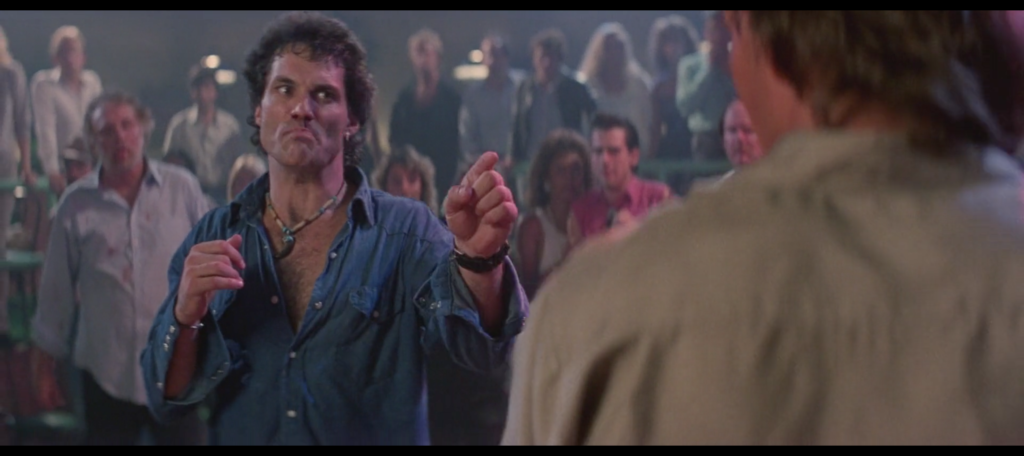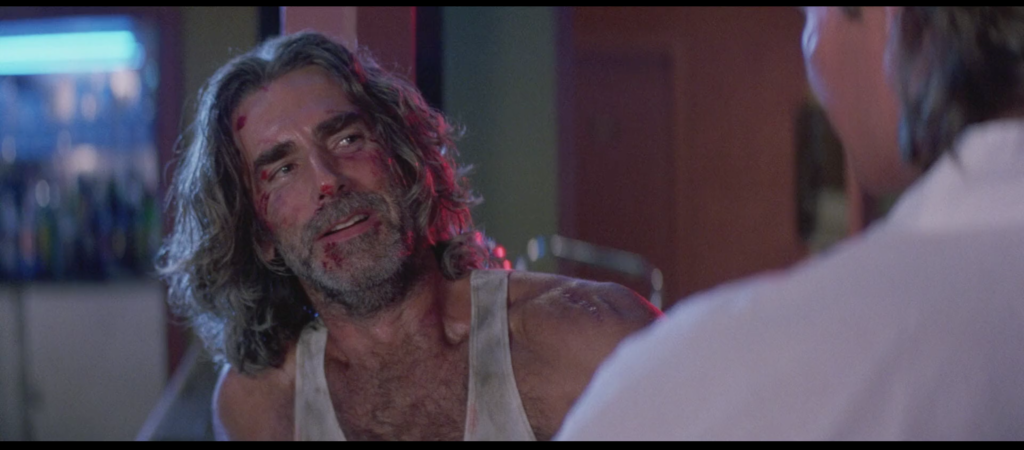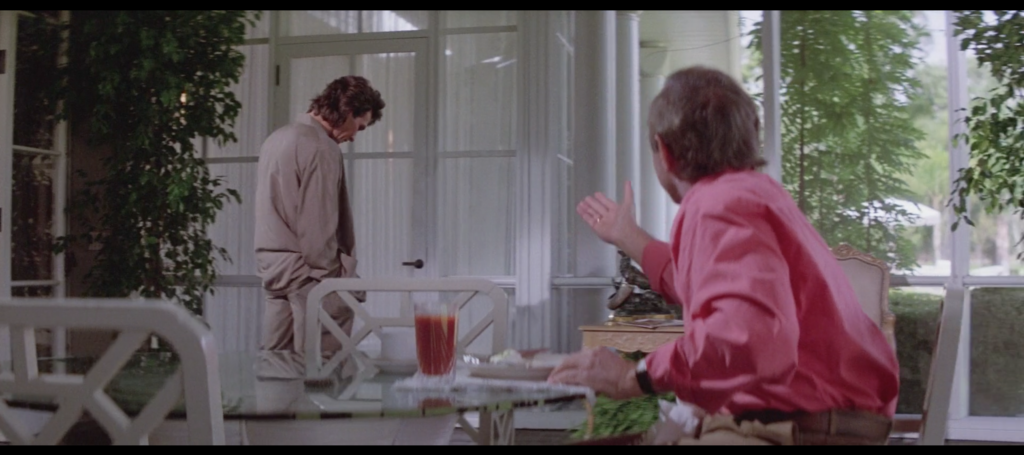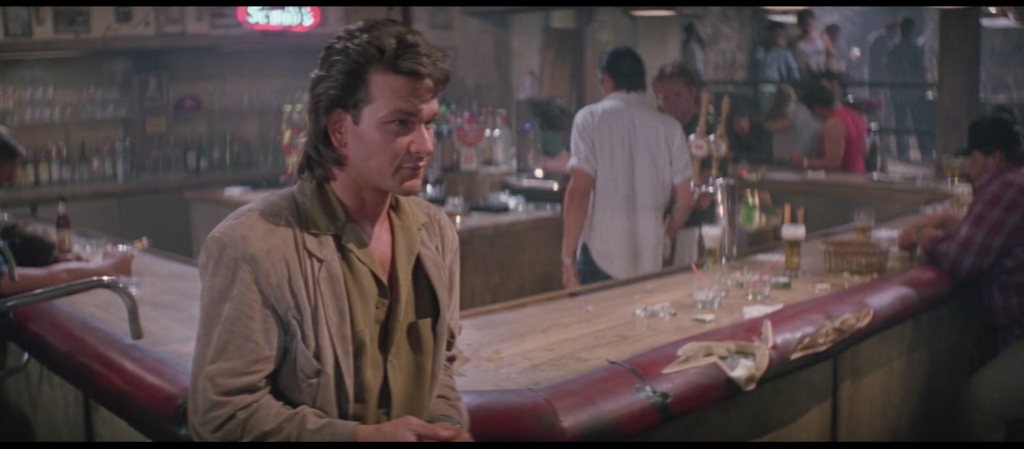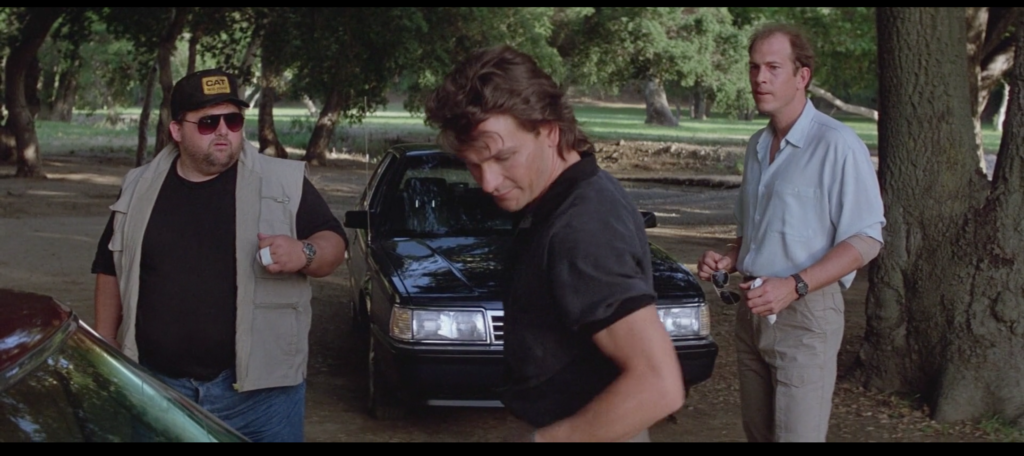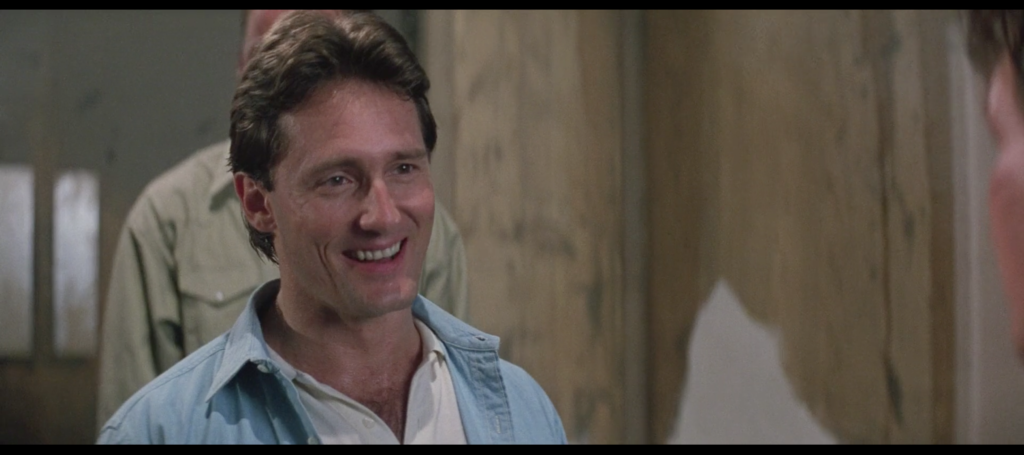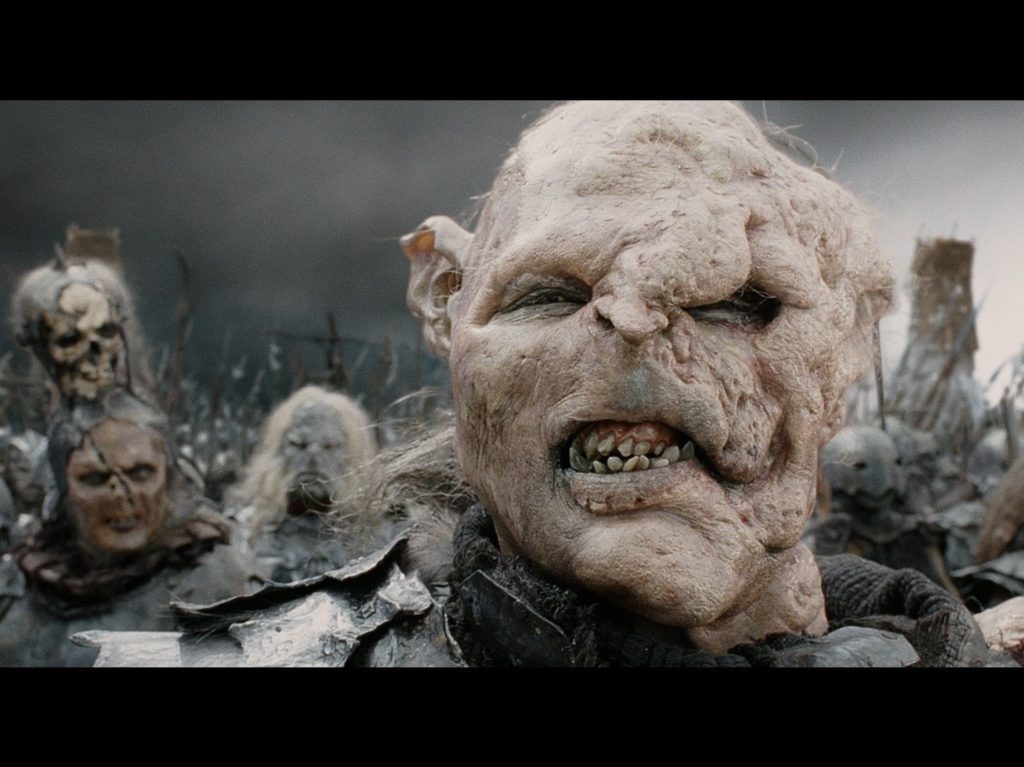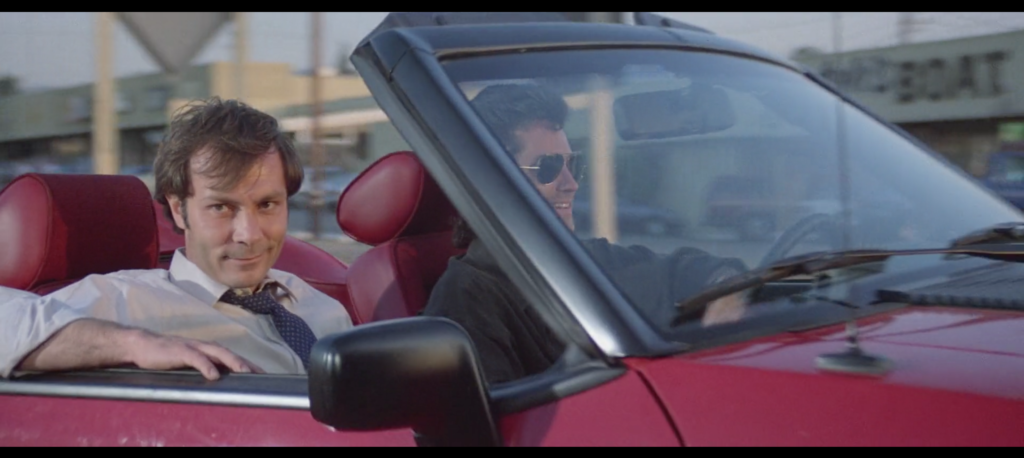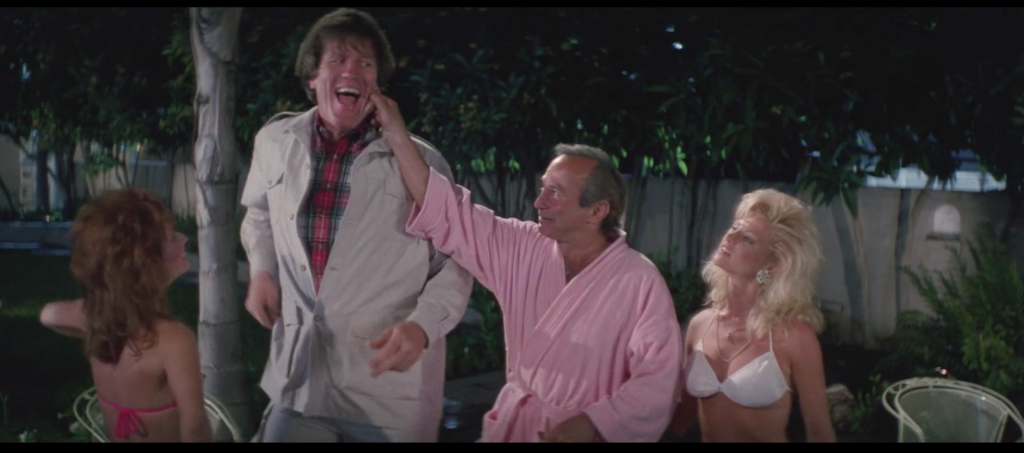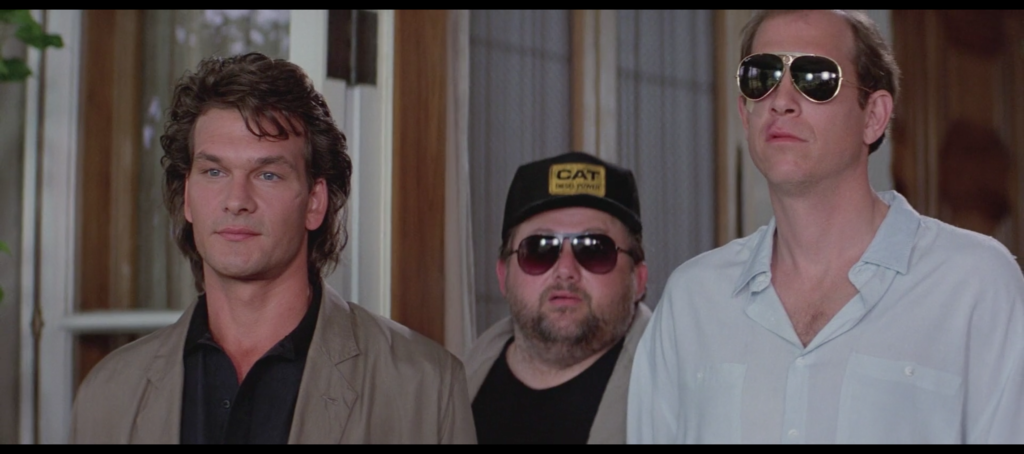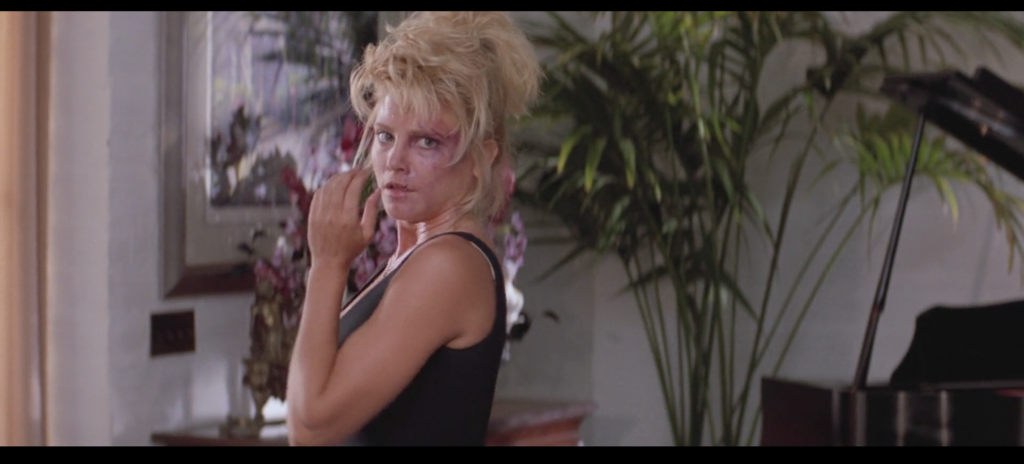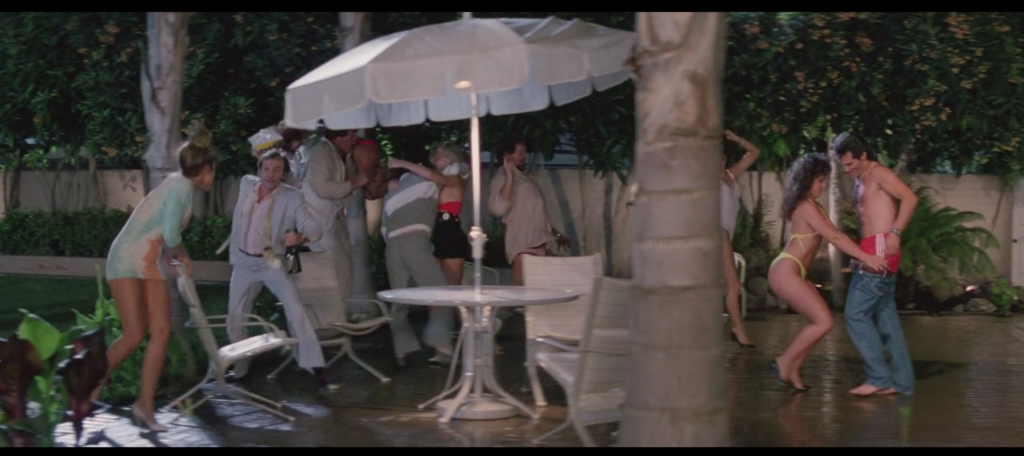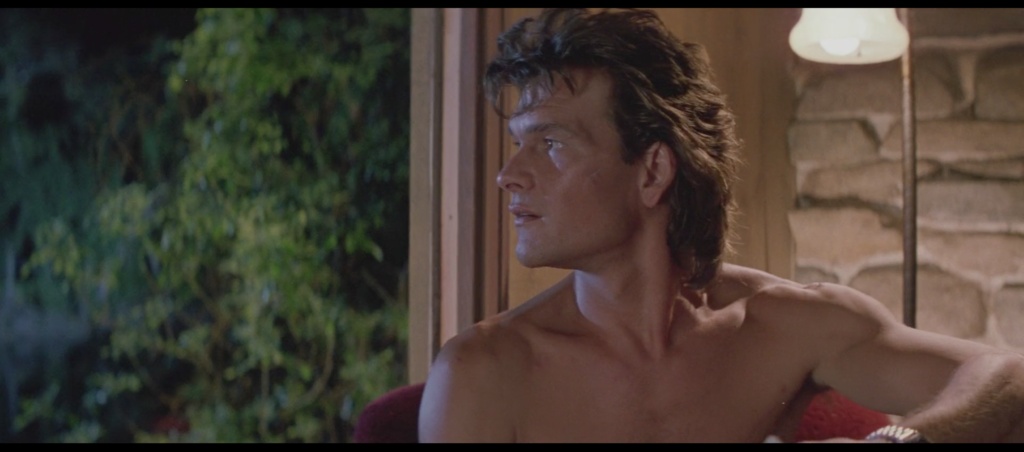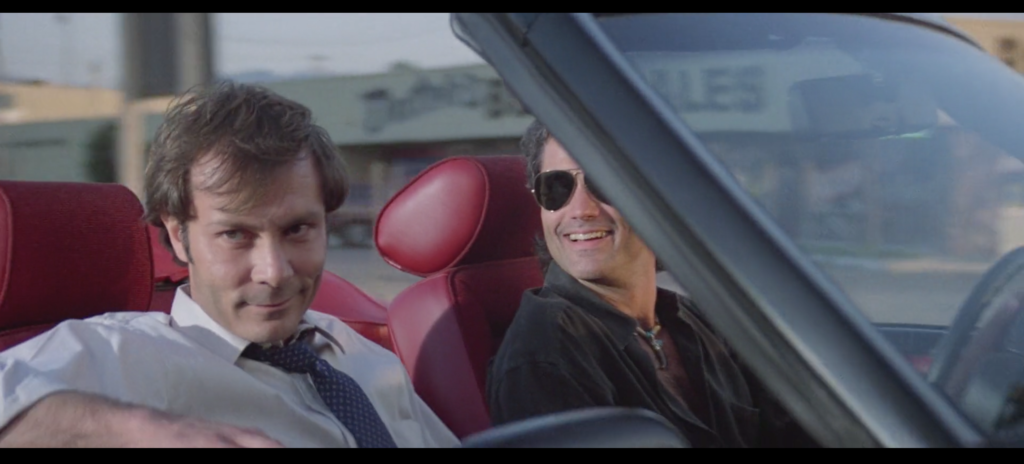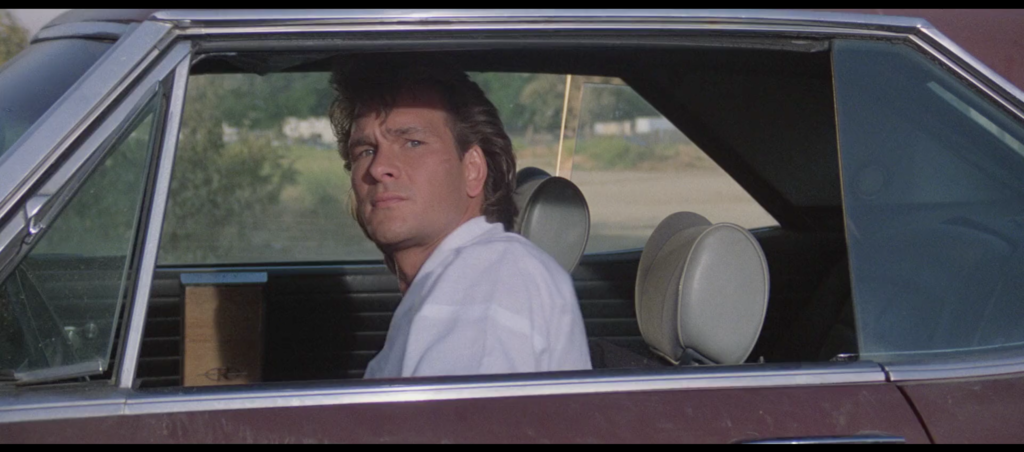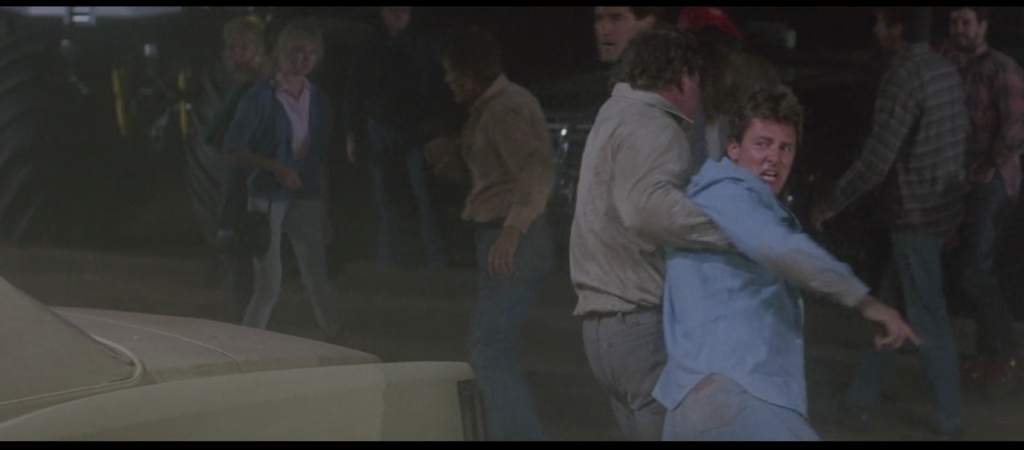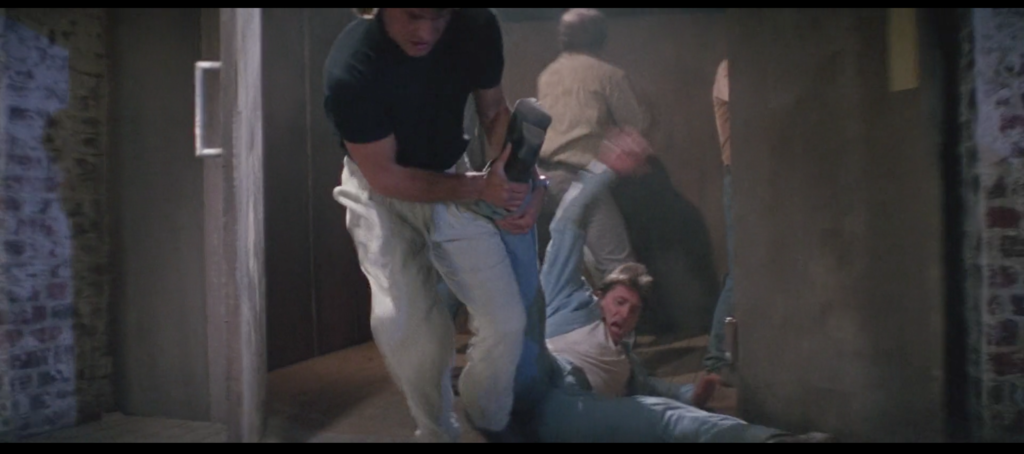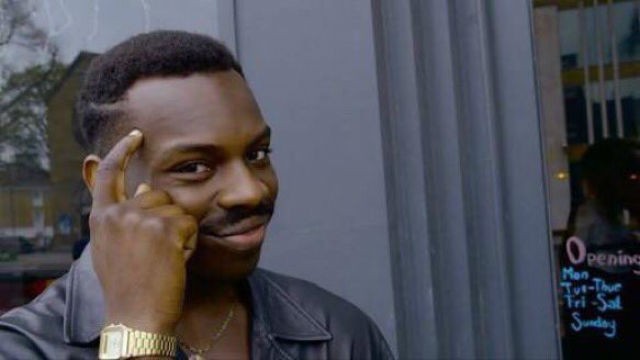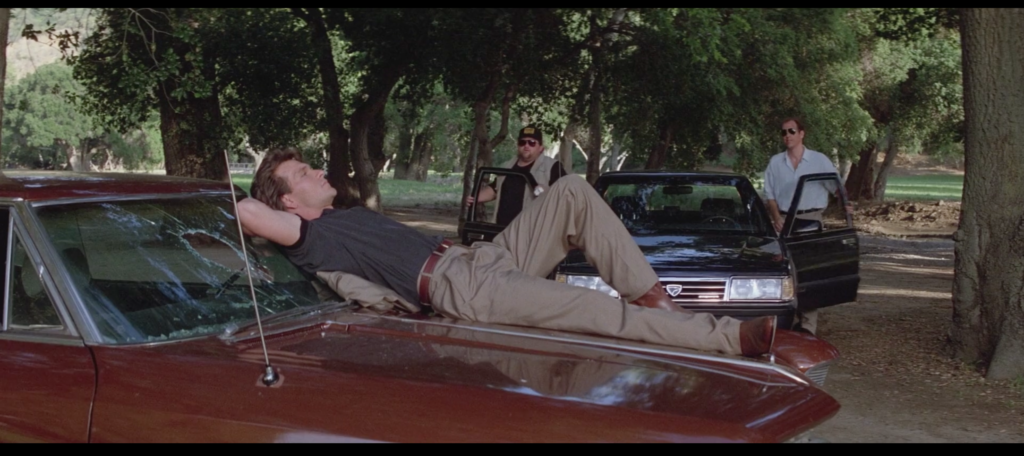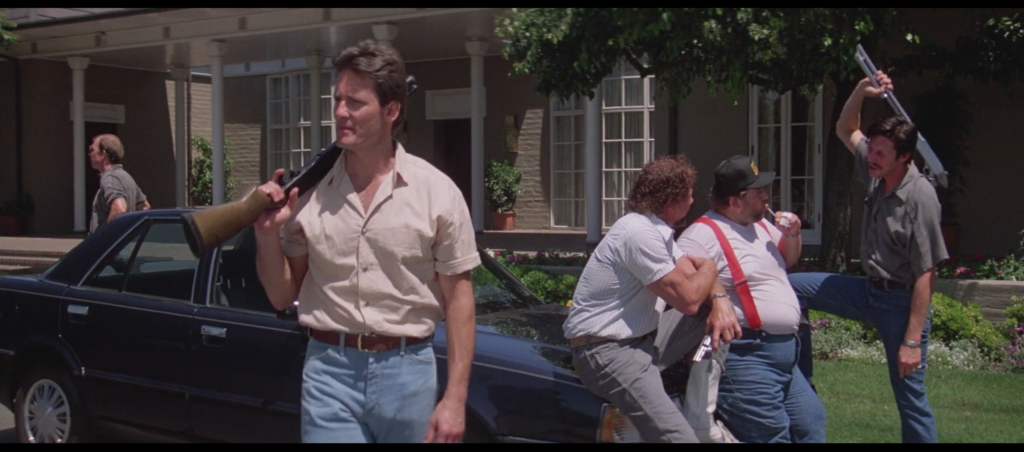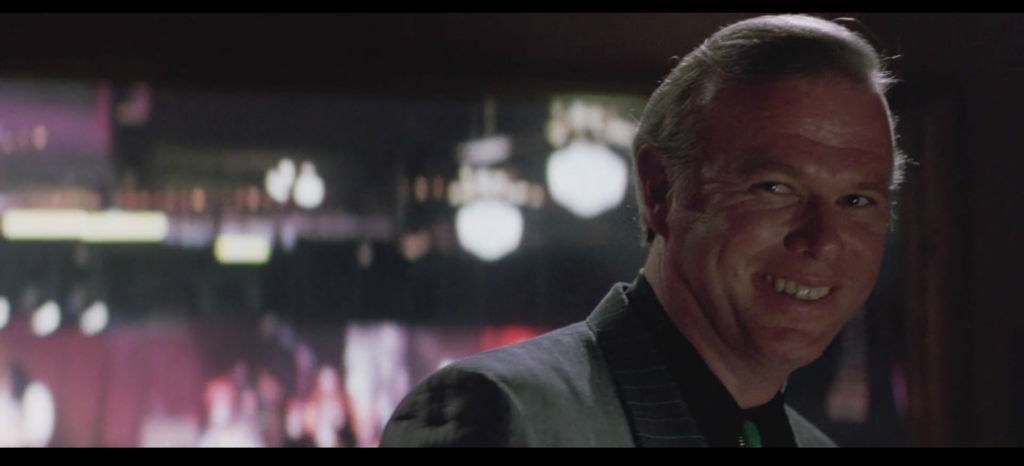Posts Tagged ‘goons’
244. Infiltration
September 1, 2019The fox is in the henhouse. The rats are in the cellar. The weasels are in the corn. Using the conveniently timed explosion of Red Webster’s Auto Parts as cover, a large party led by Mr. Brad Wesley has infiltrated the Double Deuce. They expect the same things everyone does when they go to the bar: some drinks, some dancing, a little idle chatter. But they are arsonists and hired thugs, so naturally they’re not the sort of people who’d be allowed in the bar. Indeed, Morgan, Tinker, O’Connor, and Ketchum have all been expelled from the Double Deuce, bodily so in most cases. Only by distracting Dalton, Wade Garrett, and all the bouncers with the fireball outside could they even get in.
The presence of Wesley and his cronies is all but an admission of guilt, but it’s more than that. It’s a sign that Dalton’s control is slipping. He couldn’t stop these goons from getting in. As we’ll soon see, he doesn’t succeed in getting them out, either. Brad Wesley is calling, ordering, and firing the shots here, in that order.
The time to not be nice is here.
227. “I sure ain’t gonna show you my dick.”
August 15, 2019MOUNTAIN: Are you gonna fight, dickless?
WADE GARRETT: I sure ain’t gonna show you my dick.
MIKE NELSON, RIFFTRAX: I don’t think that was even on the table! I…It wasn’t one of the options!
This brief exchange between Mountain (Tiny Ron) and Wade Garrett (Sam Elliott), and the response to it by Michael J. Nelson (Mystery Science Theater 3000), can’t be improved upon. In two lines you have all the hallmarks of Road House‘s bad-good writing style: hostility so severe it reads as a non sequitur, pointlessly escalated profanity, disconnected logic, attempted aphorisms that have never before or since been uttered by human beings. This exchange is Road House.
But to boil it down to dialogue is to miss what makes it even more Road House. Immediately after telling Mountain he is not going to show him his penis, Wade Garrett punches Mountain, you guessed it, right in the nuts. He then kicks him hard in his right knee, sending the giant tumbling to the ground with an oddly subdued “Oh, shit!””Goddamn, that hurts, dudn’t it?” Wade asks rhetorically, smirking while running his hand back over his hair. He’s not going to prove he isn’t dickless, but he’s sure as hell gonna make Mountain wish he was.
But wait, there’s more! Remember earlier in the film when Dalton told Jack “Gimme the biggest guy in the world: You smash his knee, he’ll drop like a stone?” QE motherfucking D.
So: needless profanity, needless hostility, gibberish idiom, illogic, dick joke, violence, cooler technique. Truly, this moment has it all.
226. “Take out the trash.”
August 14, 2019DALTON: I want you to be nice…until it’s time to not be nice.
YOUNGER: Well, how are we supposed to know when that is?
DALTON: You won’t. I’ll let you know. You are the bouncers. I am the cooler. All you have to do is watch my back—and each other’s…Take out the trash.
Submitted for your approval: O’Connor, beaten senseless by Wade Garrett, collapsing unconscious into a dumpster full of garbage. Essentially literally, Wade and Dalton watched each other’s backs and took out the trash. No more evidence of the efficacy of the Dalton Path’s Three Simple Rules need be presented. Everything is proceeding as he has foreseen.
225. “MIND YOUR OWN BUSINESS, DAD!”
August 13, 2019When Wade Garrett walks—actually it’s more of a mosey/saunter hybrid—through the back door of the Double Deuce, he’s greeted by quite a scene. On a concrete loading area surrounded by smashed cases of liquor, he finds two large men holding Dalton still so a third large man can pound his stomach like a punching bag with intestines inside, overseen by the largest (and at this point bloodiest) man of all. “How’s it goin’, mijo?” he asks with characteristic cool. Then Morgan, the fellow doing the punching, turns to him and absolutely snarls “MIND YOUR OWN BUSINESS, DAD!”
As my partner Julia Gfrörer once put it, “You know he’s been working up to that line for a few decades.”
That really is the only way to interpret the ferocious hostility with which Morgan imbues that paternal sobriquet, and the alacrity with which he selects it as the proper label for the older gentleman who’s just made his presence known to him. Hearing “Dad” used as an insult by a teenager is one thing, like “What are you, my dad?” when a friend objects to you trying to huff Pequa drain opener or something. From an adult, to another slightly but not really significantly older adult, it’s just…well, it raises certain questions, is what it does.
For the record, actor Terry Funk is actually a month older than actor Sam Elliott; they were both born in the summer of 1944, Terry on June 30, Sam on August 9. Perhaps, then, Dadness is merely a state of mind. A miscreant like Morgan would naturally chafe at the suggestion of supervision, as indeed he did when Dalton fired him. And a cooler like Wade Garrett, whatever his aversion to living a normal rule-bound life might be, sometimes needs must embrace his role as the enforcer, the stickler, the cooler head that must prevail. The kind of people who tell dads to mind their own business? They are his business. Morgan will soon learn this, to his dismay.
223. Quality Goonsmanship
August 11, 2019I kid, I kid the goons, and why not—they’re constantly getting their asses kicked. But look at our man Mountain here. Mountain knows that he and his comrades-in-arms have been sent to the Double Deuce with a very specific mission: Stop any and all liquor shipments. Mountain does not abandon this mission the moment Dalton throws hands. No, Mountain picks up a case of Tia Maria, throws it to the ground, turns, picks up a second case of Tia Maria, and throws it to the ground. Then and only then, after Dalton has rung the bells of Morgan and Tinker and O’Connor singlehandedly, does he turn his attention to Dalton.
Granted, once you’ve see what happens to him when he does attack Dalton—he lifts him clean off the ground in a bear hug, only to have his face bashed in by a pair of reverse headbutts—you’ll start wondering if maybe there wasn’t a third case of Tia Maria that wanted smashing. And if you pay close attention you’ll notice that by decking Morgan right into the back of the truck, toppling pretty much every remaining case of booze it contains, Dalton himself did more damage to the shipment than Mountain. But I’d consider that last bit a loss leader. Better to lose a few bottles in the process of leveling men who’d present a constant threat than to spare them but also spare the saboteurs. To flip that logic around, perhaps Mountain should have worried about the cooler first and the wine coolers second.
Be that as it may. Brad Wesley so rarely gets his money’s worth out of his “boys,” not that this dissuades him from sending the same clowns out to get got over and over again. This is Mountain’s one and only mission, and I think he acquits himself admirably, to a point. A good goon is hard to find, and he would have been a good goon, if it had been somebody there to beat the shit out of him and his buddies every minute of his life.
221. “Can I buy you guys a drink?”
August 9, 2019Irony is a valuable weapon in the arsenal of any cooler. Take Dalton, for example. When Tinker, O’Connor, Mountain, and Morgan roll up and force the liquor delivery guy to stop wheeling out crates of booze—”This bar is closed for business!” booms the Bleeder, proud to pick a fight he can win for once—Dalton hits them with all the faux-graciousness he can muster. “Can I buy you guys a drink?” he asks, expecting the answer no. Morgan, who has clearly been spoiling for a tantrum ever since Dalton gave him the boot, responds by petulantly smashing a bottle on the ground. “Guess not,” Dalton replies, and the fight is joined.
Both Morgan’s toddler destructiveness and the savagery of Dalton’s initial fusillade against his assailants—he makes mincemeat out of all of them until Morgan smashes a bottle against his head rather than the ground—go to show how much energy and emotion can be hidden under the veil of wordplay. The fig leaf of sarcasm allows a man to interact with other men despite the fact that they will soon attempt to beat one another unconscious with their bare hands, wound each other with shattering glass, and generally wreak havoc on one another’s bodies until one side or the other is unable to do any further damage. “Can I buy you guys a drink?” is one last sardonic attempt to conceal violence beneath civilization’s veneer, but the eternal struggle between cooler and goon cannot be contained forever.
220. Here Come the Goons Again
August 8, 2019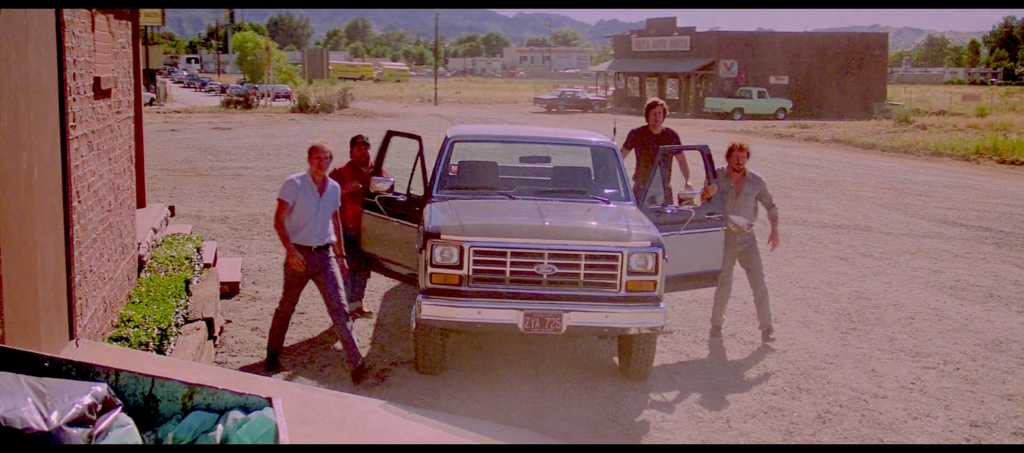
Here come the goons again
Pounding on my head like a memory
Pounding on my head like a new emotion
I want a shirt with an open chest
I want to talk like bleeders do
I want to dive clear of your boot knife
Do you bleed too much too?
O’Connor talk to me
Like bleeders do
Walk with me
Like bleeders do
Talk to me
Like bleeders do
Here come the goons again
Kick me in my head like a tragedy
Tearing out my throat like a new emotion
I want to bleed in the open wind
I want to kiss like coolers do
I want to dive clear of your knife boot
Do you bleed too much too?
O’Connor talk to me
Like bleeders do
Walk with me
Like bleeders do
Talk to me
Like bleeders do
Ooooooh
Ooooooh yeah
Here they come again
Ooooooh
Hey hey hey hey hey hey hey
Here come the goons again
Pounding on my head like a memory
Pounding on my head like a new emotion
(Here they again, here they comes again)
I want a shirt with an open chest
I want to talk like bleeders do
I want dive clear of your boot knife
Do you bleed too much too?
219. A truckload of goons pulls into a parking lot
August 7, 2019Wade Garrett is not the only miscreant to grace the dirt lot of the Double Deuce with his presence on this fateful day. Right behind him apparently—I wonder if they were stopped behind him at a stoplight at some point, not realizing what was to come—is a pickup truck full of Brad Wesleyans. There’s O’Connor and Tinker of course, who I guess haven’t gotten their asses kicked recently enough and need that sweet chin music. There’s Mountain, the gigantically tall guy last seen cavorting poolside at Wesley’s mansion; he’ll accomplish approximately that much in the fight that ensues.
Finally, there’s Morgan, the inveterate hothead tough guy played by wrestling god Terry Funk, returning to the Double Deuce for the first time since he collected his severance and was told to consider barber college and pronounced Dalton “a dead man.” (He too was last seen cavorting poolside, with his pants around his ankles no less, but he acquits himself a bit better than his towering counterpart.) You’ll recall him scoffing at the idea that Dalton has “balls big enough to come in a dump truck”; I don’t know if irony is the right word for him being a goon big enough to come in a pickup truck, but there’s something there. I dunno, we’ll workshop it.
Anyway the highlight of the moment isn’t the hero shot of all four goons rolling deep towards Dalton as he stands at the service entrance, supervising the delivery of liquor from a distributor he apparently convinced to run Wesley’s blockade. It’s Dalton’s reaction to said goons.
No confident smile this time. No squaring up, either. He looks at them through sun-squinted eyes, his shoulders rise as he inhales deeply, and then he just…sighs, silently. If you ran his body language through Google Translate you’d get Welp, here we go again, I guess.
It’s the most noncommittal thing he does in the whole film, which otherwise invests his every word and deed with energy and purpose. All his energy and purpose is directed elsewhere at the moment—at Doc, his lover, whose scent probably lingers on his body, and at Wade Garrett, his mentor, whom he called to take care of this whole liquor-blockade thing. These clowns? He’ll fight them, sure, but only because they leave him no choice. He’d just as soon they turn around and drive away. There’s only one way this is gonna end, and until then it’s just workaday drudgery. Sigh. Okay, fellas, whose face do I break first.
198. Dig a hole
July 17, 2019“Work ain’t work when you’re having fun.” By Jimmy’s own definition, then, his bit of late-night = espionage outside the Double Deuce, where he and Ketchum catch Dalton and the Doc meeting up, isn’t work. The two men are having an absolute blast discovering that their boss Brad Wesley’s ex-wife is dating his new-in-town nemesis.
“Uh-oh…” says Ketchum wryly as they take it all in.
Jimmy chuckles, rears his head back slightly, and says “Dig a hole.”
The two men then chortle and guffaw at the prospect that one or more of the people they’re spying on will be slain and buried in an unmarked grave for the crime of being an item. It’s all in the way you tell it, I guess.
It’s a noteworthy moment for several reasons. First, it’s one of the few chances we have to see goons goon it up all on their own: no one to intimidate, no one to suck up to, just two peers enjoying their job together. We’ve seen how different Dalton feels under similar circumstances, chatting with old friends like Cody and Wade Garrett. We’ll see a bit more of it among the goons near the end of the film, when Pat, Morgan, and Tinker take a few moments to discuss a young woman of their acquaintance, before Dalton assaults the mansion they’re guarding and murders most of them. The same principle applies here. Left to their own devices, out from under the watchful eyes of either Dalton or Wesley, they’re good-time Charlies. In actor Marshall Teague’s full-throated rumble, “Dig a hole” may as well be “Laissez les bon temps rouler.”
Second, we get a glimpse of how they see their own boss through this instinctual, jocular reaction to what they’re observing. They don’t say “Uh-oh, I wonder what the boss is gonna say,” or even “Uh-oh, the boss is gonna be pissed.” They jump straight to “Uh-oh, it’s murderin’ time.” When they see Brad Wesley’s ex with another man, they just assume that someone’s gonna die for it, presumably at their hands or the hands of their fellow goons. It’s just how things are done here in Jasper. This off-hand wise-aleck remark reveals as much about life under Brad Wesley as Karpis tossing Red Webster’s store or the whiskey getting cut off at the Double Deuce. More, perhaps.
Third, see the eyelines in that image above? Jimmy and Ketchum are looking downwards from the front seat of their vehicle to spy on Dalton and the Doc. That’s because their vehicle is a monster truck.
Admittedly, such a vehicle presents certain advantages on a reconnaissance mission, providing mobile high ground from which to observe the surroundings. On the other hand, and see if you follow me here, they drove a fucking monster truck to a stakeout.
They’re in the same goddamn parking lot, no less! It’s not like they could be inconspicuous if they wanted to, but they’re not even trying to hide it.
Why do neither Dalton nor Elizabeth notice the professional killers staring at them and yukking it up while perched some ten feet in the air in a comically massive motor vehicle? Maybe all that smoke blurred Dalton’s vision. Maybe his cooler-sense fails him when he’s horned up. Maybe there are enough monster trucks tooling around the streets of Jasper that Dalton would have no reason to believe this is the one driven by the guy who tried to kick him to death. Maybe—and again, stay with me here—it’s an extremely goofy movie. It’s a matter of opinion, I suppose, and you know what they say about opinions. Just remember, “Dig a hole” is not an opinion. As far as Jimmy’s concerned, it’s a spoiler.
180. Three Imaginary Boys
June 29, 2019Brad Wesley is not the only character in Road House in whose eyes Dalton is but a boy. Three others label him as such, and they could not be more different in tone and intent.
First up is Red Webster, one of the Four Car Salesmen of Jasper, Missouri. An avuncular presence in the film—literally: He is Dr. Elizabeth Clay’s uncle—he asks if Dalton is “the boy from the Double Deuce” when our hero shows up at his store before it opens to have various parts of his car replaced. Just a friendly, getting-to-know-you inquiry, from a guy calling another guy “boy” because he’s younger and he’s just arrived in town. Here, “boy” connotes “newcomer,” someone who is experiencing the world around him with fresh eyes, and who finds himself welcomed by those around him. Excepting the clientele of the Double Deuce as currently constituted, of course.
Next is Jimmy, Brad Wesely’s right hand and bastard son [source for this claim?]. “Your ass is mine, boy,” he growls, gesticulating for emphasis in case the owner of the ass of which he is claiming emphasis was unclear. Wesley has just stopped Jimmy from taking on a roughed-up Wade Garrett and a fresh-to-the-fight Dalton 2-to-1 in the Double Deuce, the night Wesley’s men blow up Red Webster’s store and Denise does an aggressive striptease to further assert Wesley’s dominance or something. Here, “boy” means a man less experienced, less tough, less dangerous, less of a man; Jimmy will use the term again when he sneers at Dalton’s fighting prowess during their eventual mano a mano showdown. (His father, spiritually anyway if not biologically, Brad Wesley will pick up the ass-owning baton and run with it, by the way, but not before Jimmy returns to that well implicitly when describing what he used to do to guys like Dalton in prison.)
The third and final boy-sayer is Wade Garrett. Staggering into the Double Deuce the night after Dalton kills Jimmy, Wade has been badly wounded in a fight with three unspecified Wesleyan goons. Dalton realizes that if Wade is still alive, it could be that the hammer is slated to fall on Elizabeth. He rushes out to find her, but not before assuring Wade that he will grant his mentor’s wish at last: They will leave this town and never look back, allowing Wesley to win rather than keep up a fight that by rights isn’t theirs. Wade looks up at the younger man and smiles. “Attaboy, mijo,” he says. Mijo, of course, means “son”; this is the “boy” of approval, of pride, of love. This is the “boy” of a dying parent’s love for his only child.
176. Human
June 25, 2019“Oh Christ,” says Brad Wesley to Dalton, “you get paid for beating people up! Tell me you don’t love it. Of course you do! You wouldn’t be human if you didn’t!” It’s a revealing moment for two reasons. First, it’s the third time in this scene alone that Wesley has employed his favorite blasphemous expletive. I’m going to assume that “Ben, you said ‘Christ’ three times that take, do you think we can go again” was not going to cut any ice on that particular set, so there’s that, but recall which character spreads a gospel with a wound in his side. Second, Brad Wesley’s defining characteristic of humanity is the enjoyment of establishing dominance by inflicting pain, particularly in exchange for cash. This squares with everything we know about him: hiring goons to strong-arm the other weird old men who own businesses around town, beating his girlfriend, citing his survival of “Korea” and “the streets of Chicago” as the sole points of interest in his pre-Jasper biography, festooning his home with the stuffed corpses of literally dozens of different slain animals. (Trust me, you haven’t seen the half of it.) If Dalton needed any more evidence that this is a man who cannot be negotiated with, he has it now. But third, when you turn it around in your mind, you can see it as proof that he does care about his “boys,” the goons. If getting paid to beat people up is a way to do what you love and love what you do, if it proves your essential humanity, then what a gift he has bestowed upon Jimmy, Ketchum, Karpis, O’Connor, Tinker, Morgan, Mountain, and his sister-son Pat McGurn, all of whom he pays to beat people up. For Brad so loved the goons, that he gave his only begotten cash, that whosoever worketh for him should not perish, but have everlasting life.
166. Details
June 15, 2019As a visual text, Road House is a chest of wonders. Look at this shot from early on in the film, on the night when Dalton first visits the Double Deuce. There he is at his familiar post, in his familiar shapeless beige jacket. There’s Pat McGurn and The Bartender Who Must Not Be Named behind him, conferring about whatever a sister-son and a working stiff who both happen to have the same job at the same place might confer about. (“So what’s it like working with Exene after the divorce? And this Mortensen kid she’s with, is he cool? Because he seems cool.”)
To the left is a power drinker, passed out on the bar; from this we can infer that Pat, ever conscious of the needs of his uncles liquor distributorship, refuses to cut off even the most obviously inebriated patrons, and most likely pressures the Nameless One into doing the same. Given the behavior of the comparatively sober customers, what does he have to lose, really.
To the right is a detail I’m just now noticing: the dry spongy exposed foam of the bar’s padding, chipped and peeled and torn away by the half-hearted vandalism of the drunk and the fixated. Back in the “everything is padded” days of restaurateurship, such artifacts of idle destructiveness were visible everywhere. I haven’t sat on an upholstered seat at an upholstered table in many a long year, but I can feel the satisfaction of ripping away a chip of covering and pulling at the porous brown stuffing underneath like my hands are doing it right now instead of typing this sentence. For all that Road House is rightfully dinged about its lack of realism, even as regards bar furniture specifically (the price of replacement tables alone from the fight about to ensue would put a normal establishment out of business), that’s some real shit.
And to the right of that? Why, that familiar fellow is none other than Brad Welsey’s own Tinker. Has he come to chat with fellow Wesleyans Pat and Morgan about the art of the goon over a few drinks when they have a moment to spare during their busy evenings of stealing from the cash register and erupting into violence over the slightest provocation? Is he additional muscle to make sure Mr. Wesley’s liquor flows without impediment? Is he simply a fan of the Jeff Healey Band? At another time during this sequence he’s seen chatting up some lovely lady; is the Double Deuce his fern bar, his Regal Beagle? Is this Tinker Tinder?
I’m reminded here of the extensive making-of documentaries included in the Lord of the Rings extended edition sets. I don’t remember the exact wording offered by the heads of the various costume and design and set departments regarding their lunatic attention to detail. I do remember the gist of it, though: They would produce intricate designs for the insides of garments and scabbards or for swords that would only be seen from a distance or for rooms no one would even enter or what have you not because the audience would see them, which they knew they wouldn’t. They did so because they were creating a world for the entire production to inhabit, not just the viewer. A cast or crew member who spent a few seconds admiring the embroidery of their breeches would be that much closer to convincingly conveying the reality of a world of orcs and elves and hobbits and magic rings. Look at the shot above, really look at it, and tell me if he war between the world’s most famous bouncers and the maniac mall devleoper who keeps their bar in Jim Beam seems as much of a stretch as it did before.
163. Bad goons
June 12, 2019Call me old fashioned, but I believe that when the insane 7-Eleven franchisee who pays you to beat people up sends you to pick someone up and bring that person to him for a conversation, and that person gets up to go with you, you shouldn’t flinch like he just pulled out a gun. Yet that is certainly the reaction of Tinker and the Bleeder when, after Tinker says “Mr. Wesley wants to see you. Let’s go,” Dalton…gets up to go see Mr. Wesley.
This is the one time in the entire film when Tinker and O’Connor do a job that does not immediately go amiss, but their loser mindset has conditioned them to expect a beating no matter what. If they’d offered Dalton a handshake and he reached out to shake hands in response they’d burst out in flopsweat while pulling out a bowie knife. If they’d asked Dalton out on a date and he showed up to the date they’d shoot at him through the window of the diner.
You could chalk this up to Dalton’s martial prowess, with some justification. I mean, you can see what happened to them the last time they tangled with the cooler the moment you look at them. But I think that when it comes right down to it, Brad Wesley does not have a good eye for talent. Does he not say so himself when, following the defeat of Tinker and O’Connor and Pat McGurn in their attempt to restore the sister-son to his job at the Double Deuce, he ruefully acknowledges he should have sent Jimmy, one of two or three goons in his employ who’s actually good at his job? (Karpis very effectively trashed Red Webster’s auto shop in his sole observable mission, and while Ketchum lost in humiliating fashion in the parking-lot brawl, he winds up running over a car dealership with a monster truck and murdering Sam Elliott.)
Small wonder the purpose of this go-see is to try and hire Dalton away from the Double Deuce. Wesley can read the bruises and gashes all over his employees just as well as Dalton can, though admittedly in O’Connor’s case he’s responsible for at least as much damage himself.
But that ship has sailed. By hiring Dalton as his first act in the creation of the new Double Deuce, and also by establishing a bridge to Wade Garrett via Dalton, Frank Tilghman once again proves himself the town’s true visionary. He is a man who builds power; Wesley, who parasitically feeds off the town just as he coasts on the hard work of the founders of JC Penney and Fotomat, can only buy it piecemeal. In the time it would take him to accrue enough Tinkers and O’Connors to take down the likes of Dalton, the fight would already be lost.
160. How to Build a Better Goon
June 9, 2019Ketchum is a forgettable goon. That’s just facts. I know who he is because I’ve watched Road House a million times, and you know who he is because you’re reading this series of daily essays about Road House. But it took me a long, long time, and many, many viewings, to put Ketchum together, as it were: that he drives the monster truck any time it shows up; that he’s the guy who tries to kick Dalton in the head with the knife in his boot and gets his ass kicked instead; that he’s the man who kills Wade Garrett, as evidenced by his retrieval of the knife used to kill him and insertion of that knife into a custom sheath on his hip; that he’s the last goon to tangle with Dalton hand to hand; that his name is Ketchum.
Alone among the goons present for the climax of the film, no one even says his name in the movie, a privilege afforded to Pat McGurn, Morgan, O’Connor, Tinker, and Jimmy. I’ve made a fuss about this over the past few months, alleging that it’s one of the reasons he’s so forgettable. But I’ve been thinking about that assertion lately, because I don’t think it has to be that way.
Consider the orcs.
Remember these handsome fellas? Sure you do. That’s Lurtz, Grishnakh, and Gothmog, from Peter Jackson’s Lord of the Rings trilogy. No one says their names in the movies. No one says any orc’s name in the movies. For that matter, Lurtz is a made-up name for a brand-new character the filmmakers introduced, and Gothmog is simply their best guess as to what a Mordor commander from the books whose species isn’t even specified by Tolkien might be like.
But if you’ve watched those movies recently, or if you find them memorable at all, you probably recall them as the uruk-hai leader with the Ariana Grande hairstyle whose head gets chopped off by Aragorn after a big fight, the raspy-voiced weasel who tries to hunt and kill Merry and Pippin before Treebeard squishes him, and the leader of the orc assault on Minas Tirith with the big puffy pink face. You remember how they look, how they sound, and what they do, because Jackson and company made a big point of giving them memorable introductions, isolating them with distinct camerawork (closeups, angles, whatever the case), and having them do their most memorable stuff right there for all to see. Lurtz was created to give the uruk-hai chasing the Fellowship a distinctive leadership figure so the film’s climax would work as such. It’s a far cry from the aggressively nondescript Ketchum first showing up as a non-speaking background character wearing face-masking sunglasses during the Bleeder scene and eventually killing Road House‘s secondary protagonist off-screen.
For that matter, it’s a far cry from these fellows.
Karpis and Mountain are also never named. They’re only shown in close-up in couple of scenes apiece; in Mountain’s case, one of those scenes is a pool party (in which Karpis appears in the background). Neither of them make it to the film’s final reel but it’s not because they get killed—they simply stop showing up, because that’s how Road House rolls.
But you remember them, right? They each have a distinctive look, with Karpis’s clothes from the Bun E. Carlos collection and Mountain’s sheer size. They each do something interesting: Karpis stares down Dalton, and Mountain dances like an idiot and later Sam Elliott tells him “I sure ain’t gonna show you my dick” before taking him down. The camera makes a point of both of them: Karpis stares right into it in closeup, while Mountain becomes the focal point as it follows Wesley and Denise into the pool party.
When it comes to differentiating your goons, bothering to say their name during the film helps, especially if you name half a dozen comparable characters during the film and run the risk of drowning the unnamed one out. (That doesn’t apply to LotR.) But you need the look, you need a distinctive action, and you need a memorable trick with the camera to make the look and the action click in the viewer’s mind. It’s a bit unfair to compare Rowdy Herrington’s work with Ketchum to Peter Jackson’s work in The Lord of the Rings, which is better at this than any other film I’ve ever seen. My point is simply, what’s in a name?
159. The future’s so bright, I gotta wear shades
June 8, 2019When Tinker and the Bleeder are sent to collect Dalton for an audience with Brad Wesley, they do so wearing bigass aviator sunglasses. It’s sunny out, I get that. But both these men have been badly beaten recently: Tinker by the bouncers at the Double Deuce, O’Connor by Dalton at the Double Deuce, and O’Connor again by his own boss, Brad Wesley, in the driveway of the very house to which he’s delivered his quarry. You can see a bandage sticking out from under the shades, in fact. Sadly he’s not the sort to wear concealer to cover up the bruise above his lip, but he’s trying his best to look healthy, together, and intimidating in front of two men who literally beat him unconscious on consecutive days. I get why: Abusers see weakness, and they hate it, and they exploit it, and it reminds them of the anger they felt when they inflicted the damage that caused the weakness and it makes them angry all over again, and god forbid word of what’s going on gets out.
I don’t mean to take this in such a heavy direction, but consider who else is in this scene.
That’s Denise, charming horny vivacious together Denise. The night before, she hit on Dalton with no regard for subtlety whatsoever: She saw what she wanted and went for it. From a personal emotional perspective it’s one of the most impressive things anyone does with anyone else in this farkakte movie, which frequently bears the same relationship to actual human interaction that Lego minifigures have to actual human hands. But it takes place in front of Jimmy, Brad’s bastard son [citation needed], who drags her strugging out of the bar, through the parking lot, and into a nearby vehicle. Jimmy gives the high sign to Ketchum and his squad of men who’ve ordered the Rooty Tooty Fresh ‘n’ Fruity at IHOP after church on Sunday move in to attempt to assassinate the man she just hit on by kicking his skull with a knife. Denise, it appears safe to assume, is brought back to Brad Wesley’s house, where he and perhaps Jimmy beat the living fucking shit out of her.
I’ll give Dalton this much regarding his conduct toward Denise, a definite character lowlight in many other regards: Seeing what Brad Wesley did to her seems to factor into his last-straw decision to react to Wesley’s overtures with open hostility. I say “seems” because he’s most visibly pissed off when Wesley brings up the fact that Dalton killed a man who’d discovered he was fucking his wife, and that could be enough. I’m just giving him the benefit of the doubt is all.
Anyway, you’ll notice no sunglasses have been afforded to Denise. No warning that Brad would be receiving company, either. She’s in the middle of an aerobics routine with music blasting when Tinker and O’Connor roll in with Dalton in tow, because getting beaten bloody by your boyfriend is no justification for an off day.
In conclusion, O’Connor and Tinker get off easy, and O’Connor gets murdered by the end of the movie. Throw some sunglasses on his corpse.
156. “Now you will see me one more time if you do good. You will see me two more times if you do bad. Goodnight.”
June 5, 2019147. Look Back in Anger
May 27, 2019In addition to “embedding a knife in a boot” and “murdering Wade Garrett” and “being Mister Clean Jeans,” Ketchum has a leg up (wink!) on his fellow goons in one other respect: He is outraged that Dalton has the temerity to whip his ass. “Son of a bitch!” he shouts at the cooler as Captain Turner pulls him away, one boot on, one boot somewhere above the streets of Jasper. It’s the same verbiage employed by Carrie Ann when she brains some drunken dipstick with a beer bottle in the middle of that full-scale riot within the bar earlier in the film. She’s just a working woman trying to make a living and not get groped or punched or forced to bear witness to other people enduring the same. Ketchum is a paid killer who just attempted to murder a man by kicking him in the skull with a knife-shoe. That man intercepted the killing Rockette maneuver and simply followed the Three Simple Rules in response. But does this keep Ketchum from acting like he’s the wronged party once things don’t go the way he wants them to? Heavens no. Not one for simply going quietly and licking his wounds is Ketchum. One last “how dare you sir,” in modern vernacular of course, is required before he drifts away, allowing Dalton to go on a date with Dr. Elizabeth Clay that will change the lives of all three of them. (Death changes your life.) In Ketchum’s climactic whinge you hear the sound of privilege. Like his boss Brad Wesley, who expresses surprise that anyone would resist him more than once as the film continues, Ketchum does not believe those he oppresses have the right to fight back. But it’s more than that: He does not believe that those he oppresses should even be able to formulate the knowledge, desire, and will the very notion of “fighting back” requires. They should be as blissfully unaware of their power in this situation as an animal that has briefly slipped loose of its bonds and, should it realize its chance for freedom is upon it, could reduce its human handler to red wreckage. But they don’t realize. Neither, according to the only form of morality the Wesleys and Ketchums acknowledge, should the hoi polloi of Jasper.
J.R.R. Tolkien once said “I think that many confuse ‘applicability’ with ‘allegory’; but the one resides within the freedom of the reader, and the other in the purposed dominion of the author” and I think about that a lot.
144. The thousand injuries of Fortunato I had borne as I best could, but when he ventured upon insult I vowed revenge.
May 24, 2019Here’s Ketchum, the clear second to Jimmy in the hierarchy of Brad Wesley’s goons and his successor upon his death in much the same way that the unspecified entity Gothmog assumed control of the assault on Minas Tirith following the death of the Witch-king of Angmar, getting dragged out of the Double Deuce on his ass into the dirt parking lot outside. Bumpty bumpty bump, right down the front steps, squealing and mewling over his injured ankle all the way. In a matter of seconds, Dalton thwarted his assassination attempt, caught his leg in midair, ruthlessly twisted it, yelled “You’re too stupid to have a good time!” right in his face, toppled him to the ground, and dragged his ass, literally, into the dirt, also literally. Such is the indignity of this forced exit that, get this, his extended free leg is actually what opens the right-hand door (facing the building) while Dalton shoulders open the left. He is forced to facilitate his own humiliating defeat.
Now in addition to being the most anonymous of Wesley’s core goons, Ketchum is also the least sympathetic. My guess is that the two phenomena are interrelated. Can’t feel sympathy for a guy you can’t remember!
But recall that in the world of the story, Ketchum is a thought leader, a ring general , a man to whom the Tinkers and Bleeders and sister-sons of the world are supposed to look for guidance. Both Tinker and O’Connor—Tinker! and O’Connor!—fare better in their fight against Dalton than Ketchum does in his. Dalton beats Ketchum like a mule. To keep up the ring-general jargon, bahgawd ref, stop the damn match.
Later in the film, Ketchum murders Wade Garrett.
“They’re not my brothers,” Jon snapped. “They hate me because I’m better than they are.”
“No. They hate you because you act like you’re better than they are. They look at you and see a castle-bred bastard who thinks he’s a lordling.” The armorer leaned close. “You’re no lordling. Remember that. You’re a Snow, not a Stark. You’re a bastard and a bully.”
“A bully?” Jon almost choked on the word. The accusation was so unjust it took his breath away. “They were the ones who came after me. Four of them.”
“Four that you’ve humiliated in the yard. Four who are probably afraid of you. I’ve watched you fight. It’s not training with you. Put a good edge on your sword, and they’d be dead meat; you know it, I know it, they know it. You leave them nothing. You shame them. Does that make you proud?”
Jon hesitated. He did feel proud when he won. Why shouldn’t he? But the armorer was taking that away too, making it sound as if he were doing something wrong. “They’re all older than me,” he said defensively.
“Older and bigger and stronger, that’s the truth. I’ll wager your master-at-arms taught you how to fight bigger men at Winterfell, though. Who was he, some old knight?”
“Ser Rodrik Cassel,” Jon said warily. There was a trap here. He felt it closing around him.
Donal Noye leaned forward, into Jon’s face. “Now think on this, boy. None of these others have ever had a master-at-arms until Ser Alliser. Their fathers were farmers and wagonmen and poachers, smiths and miners and oars on a trading galley. What they know of fighting they learned between decks, in the alleys of Oldtown and Lannisport, in wayside brothels and taverns on the kingsroad. They may have clacked a few sticks together before they came here, but I promise you, not one in twenty was ever rich enough to own a real sword.” His look was grim. “So how do you like the taste of your victories now, Lord Snow?”
“Don’t call me that!” Jon said sharply, but the force had gone out of his anger. Suddenly he felt ashamed and guilty.“I never…I didn’t think…”
“Best you start thinking,” Noye warned him. “That, or sleep with a dagger by your bed. Now go.”
—George R.R. Martin, A Game of Thrones
141. Dalton in repose
May 21, 2019When we find Dalton lying on his back, hands behind his head, eyes open, under a shady tree, just daydreamin’, whilin’ away the hours, conferrin’ with the flowers, consultin’ with the rain, it behooves us to review recent events in his life. In reverse order these include an astonishingly awkward first date with Dr. Elizabeth Clay, during which you’d be hard pressed to find something she said to him that wasn’t a brutal neg; a parking-lot brawl with a man with a knife in his boot, which is how Elizabeth found him when she arrived for their date; a call to his mentor Wade Garrett in which we receive the first intimations of the depths of Dalton’s concern about Brad Wesley; the discovery that Wesley and his goons are bracing local businesspeople for protection money; getting stitched up for a knife wound incurred in a previous brawl with Pat McGurn, O’Connor, and Tinker, during which process he meets Dr. Elizabeth Clay for the first time; the brawl itself, during which the knife wound is incurred. “Man, this guy has it good” is not a thought I’d have.
Yet it’s a thought radiated by every inch of his body (and magnificent hair) as he lies there on that car. A car which was destroyed—did I mention this?—by disgruntled opponents yet again, sometime between when he defeats Ketchum and the Church Elders in the parking lot and departs for his date with the Doc and when they return to the lot later that night. They pulled a stop sign out of the ground and shoved it through his front windshield, man. I’m not having much trouble reading the symbolism there, but Dalton either is having that trouble, or, and this is more likely, he’s completely untroubled by it at all. He’s gonna take five on the battered body of his car, gonna kick back on that thing and take in the fragrance of nature in the parlance of Emmett’s times like it’s a hammock. He’s living easy, loving free, season-ticket on a one-way ride, asking nothing, leave him be, taking everything in his stride.
Even when Tinker and the Bleeder show up he doesn’t so much as look their way. I’ll remind you here, in case you forgot what happened a couple of paragraphs ago, that Tinker is the man who sent him to the hospital with a knife wound, and O’Connor is the man who helped set him up for that injury. Dalton proceeded to beat the holy hell out of O’Connor while his bouncers doubled up on an immobilized Tinker like they were hitting the heavy bag. There’s no reason for Dalton not to believe these men have come to kill him, because they’ve already tried. I wouldn’t imagine blowing it has cooled their enthusiasm for the prospect.
But that’s Dalton right there, chilling TF out on a vehicle trashed by his mortal enemies, in a body also trashed by his mortal enemies, as his mortal enemies approach.
And yet they are the ones who flinch the second he moves. This despite outnumbering him. This despite being on their feet while he has to get up from a supine position. This despite the fact that, you know, the reason they’re there is to get him to get up and come with them, like him getting up and coming with them is baked right into the premise of their little errand here.
But—and I can’t believe I’m saying this given my strong anti-goon bias—goons sometimes see things the rest of us cannot. (Maybe it’s the sunglasses.) O’Connor and Tinker don’t see a man mellowing out despite all the signs surrounding him that he should not. They see a rattlesnake sunning itself on a rock. You ever seen something like that? They look pretty chill too. Pretty calm, pretty relaxed, pretty vulnerable. I’m not about to fuck with one though and neither are you, are you. We see the kinetic inherent in the potential. We remember the Good Book: The serpent is subtle.
140. What’s better than this?
May 20, 2019Here, in a quiet moment near the end of the film just prior to the situation coming to a head so to speak, we see the goon in his natural environment. O’Connor, Ketchum, Morgan, Tinker, Pat McGurn: All of them have tucked their favorite short-sleeved shirts into their favorite pairs of jeans and settled in on the front lawn of the mansion owned by the Peter Pan to their Lost Boys, Brad Wesley. As you can tell from the shooting irons, this is not a company picnic or a cookout with the boys; they’re here to protect Brad Wesley from Dalton, whom they rightfully assume is on his way to kill them all because they murdered his best friend. You’ll have cause to wonder why, given the predictability of and ease of access to Dalton’s whereabouts—he in fact receives a phone call taunting him about the impending murder in the very location where that murder eventually takes place in his absence—they did not simply cut out the middleman as it were and murder him instead. Perhaps, given their superior numbers and lack of compunction about bringing guns to a knife fight and so on down the fight escalation scale, they did not split up to murder them both. Just blue-skying here: One could even imagine a scenario in which the large quantity of explosives the Brad Wesley organization has used to destroy Red Webster’s place of business and Emmett’s cottage could instead have been employed to blow up the Double Deuce (across the street from Red Webster’s store) or Dalton’s barn apartment (approximately two hundred feet away from Emmett’s house). It’s almost as if the goal were to deliberately goad the best fighter in Jasper into a mano a mano with a demented old man who likes JC Penney, reckless operation of motor vehicles, and music with balls. And if that were the case—well then, one would wonder, wouldn’t one, whether the very orchestration of such a plan signals a wish on the part of Brad Wesley’s men, or Brad Wesley, or some other and still more nefarious figure working behind the scenes, the hole in things, the Enemy, the piece that can never fit, there since the beginning, that Brad Wesley and his men be removed from the playing field permanently, and that if Dalton himself should die in the process of that removal, well, so be it.
But that’s crazy talk, isn’t it.
<Swearengen voice>Anyways,</s> the goons and their paymaster are to be congratulated on the success of their plan, which does indeed lure Dalton into the Wesley estate, at full speed, no holds barred, no quarter asked and none given. Few things will get an experienced killer in a killing mood than killing one of the men who trained them in the techniques that allow them to kill, and once the experienced killer is in that killing mood, he needs must find the people he desires to kill, and a good place to check is if one of them owns a mansion, then it’s that mansion. So kudos are due in that respect.
Until Dalton drops by, however, the goons are left to their own devices. Their mixture of vigilance and utter disregard for firearm safety is the purest visual expression of the goonsmanship levels evidenced in this film. Ketchum and the Bleeder? Silent sentinels, eyes at nine and six, ready for anything. Morgan, Tinker, and the sister-son? Holding a pistol the way you hold your phone when you’re trying to check the text that just came in but you’re doing a million things and you grab it at kind of an awkward angle but now you’re stuck with it that way until you put something else down, eating a lolipop, and scratching his back with the butt of a shotgun while saying “Remember that blonde? Shhyew. She could suck-start a Harley.” Ruthless efficiency coupled with a generated sense of wonder that any of these men lived past high school: That is the Way of the Goon. Bask in it.
Bask in it while you can, anyway, since all but one of these men will be dead within two and a half minutes.

